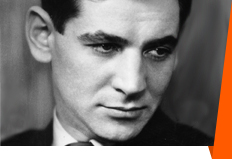
NOTES ON THE PIECES
- Leonard Bernstein
- Arias and Barcarolles
- Halil
- Concerto for Orchestra (Jubilee Games)
- Mass
- On the Town
- Prelude, Fugue and Riffs
- Serenade (After Plato’s Symposium)
- Symphony No. 1, “Jeremiah”
- Symphony No. 2, “The Age of Anxiety”
- Symphony No. 3, “Kaddish”
- West Side Story Suites
Prelude, Fugue and Riffs
An erudite, sophisticated, and classically trained musician, Leonard Bernstein was practically the diametrical opposite of George Gershwin, a “natural” with a limited musical education. Gershwin had encountered Chopin, Liszt, and Debussy when learning the piano; later, he studied harmony and counterpoint, acquiring only a limited knowledge of the subjects. In 1924, Paul Whiteman, the self-titled “King of Jazz,” presented An Experiment in Modern Music at the Aeolian Hall in New York, at which Gershwin, by then the most successful song composer of the day, performed his Rhapsody in Blue—basically, four themes cleverly woven together and orchestrated by Ferde Grofé (of Grand Canyon Suite fame).
Excerpt from Bernstein’s Prelude, Fugue and Riffs for Solo Clarinet and Jazz Ensemble
Columbia Jazz Combo / Leonard Bernstein, Conductor; Benny Goodman, Clarinet. Sony Classical SK 60559.
Find this and more of Leonard Bernstein’s work at ArkivMusic.com ›
Bernstein was an admirer of Gershwin whose main challenge—and wouldn’t we all want to have the same problem—was deciding whether he was primarily a composer, a conductor, a concert pianist, or a brilliant teacher and educator. When he composed Prelude, Fugue and Riffs—a work with neither the literary nor dramatic implications that usually inspired him—he managed to create a genuine jazz piece with the sense of improvisation that is traditionally associated with the medium. Other composers tried—Stravinsky’s “Ebony” Concerto and Ragtime as well as Milhaud’s Scaramouche come to mind—but those works have the feel of a classical overview. In Bernstein’s case, the music has the improvisational quality of a jazz creation, even when he writes a fugue, probably the most intellectual, or anti-improvisational, discipline. It is also fascinating that, simply by playing his notes, such staid and dignified musicians as members of the Vienna Philharmonic swing along with the best of them!
—Paul Myers
Paul Myers, a classical record producer for more than 40 years, is the author of several books, including a biography of Leonard Bernstein (Phaidon).
© 2001–2008 Carnegie Hall Corporation
- Home
- |
- Multimedia
- |
- Press
- |
- Partners
- |
- Supporters





